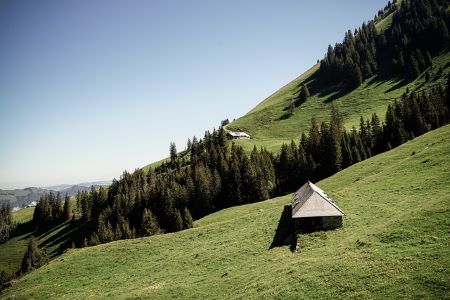Switzerland, surrounded by the stunning Alps, is famous for its stunning views, delicious chocolates, and diverse cultural history. However, beyond the beautiful scenery, Switzerland also has a unique linguistic aspect. In case you wonder what language is spoken in Switzerland, the country is home to four national languages: German, French, Italian, and Romansh.
What language do they speak in Switzerland?
A Nation of Four Languages:
- German: The dominant language, spoken by over 60% of the population, is Swiss German, a collection of distinct Alemannic dialects. Thus, it may sound different from standard German!
- French: Spoken in the western regions, French holds cultural significance and is used in communication with the federal government.
- Italian: Spoken in the southern canton of Ticino and parts of Grisons, Italian adds another touch to the linguistic landscape.
- Romansh: A unique Rhaeto-Romance language, spoken in a small southeastern region by about 0.5% of the population.
Language in Switzerland: A Product of History and Geography
Switzerland’s ability to communicate in multiple languages is a result of its rich historical and geographical diversity. The prevalence of German in the country reflects the Germanic roots of the majority of the population. The presence of French and Italian languages is indicative of the influence of neighboring France and Italy, while Romansh has persisted in the secluded mountain valleys of the country.
Living with Multilingualism in Switzerland
- Official Languages: All four languages have equal status at the federal level, ensuring inclusivity and respect for cultural diversity.
- Regional Variations: Each language has its own regional variations, adding to the linguistic richness of the country.
- Language Learning: Multilingualism is a way of life in Switzerland. Many citizens are proficient in two or more languages, fostered by a robust education system that promotes language learning.
Bridging the Gaps
- English: While not an official language in Switzerland, English is widely understood and used in tourist areas and the business world.
- Bilingual Cantons: Some cantons, like Fribourg and Valais, are officially bilingual, reflecting their unique linguistic heritage.
Switzerland’s multilingualism is more than just a linguistic phenomenon; it’s a celebration of cultural diversity and a testament to the country’s peaceful coexistence of various communities. So, the next time you visit Switzerland, take a moment to appreciate the beautiful symphony of languages that echoes throughout this remarkable country.
Best Time to Visit Switzerland
The best time to visit Switzerland depends on what you want to do while you are there. Here is a breakdown of the pros and cons of each season:
Summer (June-August)
Switzerland in summer
- Pros: Warmest weather, ideal for hiking, biking, and swimming in lakes, most festivals and events happen during this time.
- Cons: Most crowded and expensive time to visit, some mountain passes may be closed due to snowmelt.
Autumn (September-October)
Switzerland in autumn
- Pros: Pleasant weather, beautiful fall foliage, fewer crowds than summer, good time for hiking and sightseeing.
- Cons: Some outdoor activities may be limited due to colder weather, some businesses may have shorter hours.
Spring (April-May)
Switzerland in spring
- Pros: Pleasant weather, wildflowers in bloom, fewer crowds than summer, good time for hiking and sightseeing.
- Cons: Some mountain passes may still be closed due to snow, some businesses may not be open yet.
Winter (December-March)
Switzerland in winter
- Pros: Winter wonderland scenery, ideal for skiing and snowboarding, Christmas markets, fewer crowds than summer.
- Cons: Coldest weather, some outdoor activities may be limited due to snow, some mountain passes may be closed.
Here’s a quick summary to help you decide:
- For hiking and outdoor activities, spring (late May to June) and autumn (September to October) are the best times to visit.
- For skiing and snowboarding, winter (December to March) is the best time to visit.
- For sightseeing and avoiding crowds, spring (April to May) and autumn (September to October) are the best times to visit.
No matter when you decide to visit, Switzerland is a beautiful country with something to offer everyone.
Best Cities to Visit in Switzerland
Switzerland is a landlocked country in Central Europe, renowned for its mountain ranges (including the Alps), its lakes, and its valleys. Here are some of the major cities you can visit in Switzerland:
Zurich
Zurich is the largest city in Switzerland. It is a global center for banking and finance and is home to many international companies. The city has a beautiful old town with cobbled streets, churches, and shops.
Geneva
Geneva is the second-largest city in Switzerland. It is located on the shores of Lake Geneva and is home to many international organizations, such as the United Nations and the World Health Organization. Geneva is famous for its luxurious shops, its chocolate, and its international atmosphere.
Basel
Basel is a major cultural center in Switzerland. It is home to many museums, including the Kunstmuseum Basel, which houses a collection of art from the Middle Ages to the present day. Basel is also famous for its annual carnival, which is one of the largest in Europe.
Lausanne
Lausanne is the capital of the canton of Vaud. It is located on the shores of Lake Geneva and is a popular tourist destination. Lausanne is home to the International Olympic Committee and the International Institute for Management Development.
Bern
Bern is the capital of Switzerland. It is a beautiful city with a well-preserved medieval old town. Bern is known for its bears, which can be seen in a special enclosure in the city center.
Lucerne
Lucerne is a popular tourist destination in Switzerland. It is located on the shores of Lake Lucerne and is surrounded by mountains. Lucerne is known for its Chapel Bridge, a wooden bridge that was built in the 1330s.
Interlaken
Interlaken is a resort town in the Bernese Oberland region of Switzerland. It is located between Lake Brienz and Lake Thun and is a popular destination for winter sports and summer activities.
Montreux
Montreux is a resort town on the shores of Lake Geneva. It is known for its mild climate, its beautiful scenery, and its jazz festival, which is held every summer.
Lugano
Lugano is the largest city in the canton of Ticino. It is located on the shores of Lake Lugano and is surrounded by mountains. Lugano is famous for its Italianate architecture and its beautiful gardens.
Fribourg
Fribourg is the capital of the canton of Fribourg. It is a bilingual city, with French and German spoken as official languages. Fribourg is known for its beautiful old town, its cathedral, and its suspension bridge.
Learn New Vocabulary with Anki Flashcards
Discover Anki Decks by ADROS VERSE EDUCATION to learn and practice these languages. Anki will show you the flashcards at spaced intervals, helping you to learn and retain the information.



